by Jedidiah Yueh
Will Elon Musk be our savior or our destroyer?
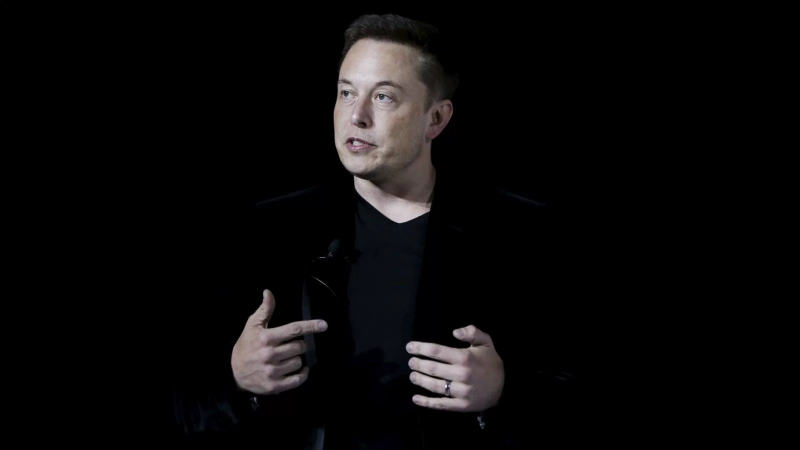
The world has finally met its first mad scientist: Elon Musk.
Elon Musk is a Dickensian figure. He’s tall and imposing, but with an oddly boyish face. His expressions bear faint traces of scars from his past, of the suffering he endured growing up in the chauvinistic, violent world of South Africa. He seems to balance that well, however, with Amber Heard or some other actress on his arm.
Musk’s ambition and reach know no bounds. He makes Google’s famous moonshots look unambitious by literally aiming for Mars.
In his latest announcement, Musk unveiled plans to send you anywhere in the world in 30 minutes for the price of an economy ticket. “If we are building this thing to go to the Moon and Mars,” he said, “then why not go to other places on Earth as well?”
In addition to rockets (SpaceX), his current and prior companies produce electric cars (Tesla), solar tiles (SolarCity), and electronic payments (PayPal). He’s now boring tunnels to battle traffic (the Boring Company), and investing in technology to turn us into cyborgs (Neuralink). All this while combating the specter of AI gone wild (OpenAI).
If there’s anyone who embodies the spirit of “you can do anything if you put your mind to it,” it’s Elon Musk.
Size Matters
When it comes to vision, size matters. No one wields a bigger vision than Elon Musk.
We put a man on the moon in 1969, at the height of the Cold War. After the decline of the Soviet Union, NASA fell from the pinnacle of the world’s stage into an archaic, darkened technology basement.
It took until Elon Musk’s arrival for rocket science to reemerge on the world stage. Musk’s vision at SpaceX is “to enable people to live on other planets,” a plan B for planet earth.
Instead of sending people to the moon, Musk wants to colonize Mars.
This embed is from an external site and no longer seems to be available
There are limits to vision. Myopia is a risk, but hyperopia (farsightedness) is an equal risk. If you can’t execute on the vision, it’s not vision. It’s vain ambition.
In 2008, Elon Musk was a single failed rocket launch away from catastrophically imploding. Tesla missed its shipment date (again) and was quickly hemorrhaging its remaining cash. The first three rockets launched by SpaceX had failed, one literally exploding, and the company could afford only one more attempt.
Despite suffering three consecutive strikes, Musk pledged in a company announcement, “I will never give up and I mean never.”
He had invested all his returns from Zip2 and PayPal, had convinced his family and friends to invest their savings, and was on the brink of bankruptcy.
If that fourth rocket had failed to launch, Elon Musk may never have recovered.
But it succeeded, and after some serious financial maneuvering, Musk convinced Tesla’s investors to extend another round of financing as well.
Elon Musk walked the bare knife’s edge of success and failure, and lived to tell the tale. But what if the knife cut the other way? What if it cuts the other way for humankind?
Unintended Polar Consequences
If I were crafting Elon Musk’s personal vision and mission, it would say, “Humankind is out of control. My mission is to save humankind from itself.”
The challenge with mad scientists is that they inevitably forge knives that cut both ways.
Musk founded OpenAI to combat the existential threat to humankind posed by AI. He’s been a public advocate of government regulation for technology companies and their AI programs.
But government can’t be the answer. The cycle time for governments to understand the technologies and threats, and then implement regulations, is far too long compared to the fast, iterative cycles of AI development.
Worse, even if governments listen to Musk, not all of them will comply. Russia and China will almost certainly ignore regulations. And Musk himself tweeted, “It begins … ” about Vladimir Putin’s view on the importance of AI.
If we regulate AI development in the countries that comply, aren’t we leaving AI — the most dangerous potential invention in human history — in the hands of the countries that refuse? Isn’t Musk playing right into Putin’s hands?
As part of his anti-AI strategy, Musk also founded Neuralink to act as a method for humans to evolve into cyborgs with a computer-connected neural lace.
If AI can reprogram our societies using Facebook’s feed, wouldn’t a neural lace give unprecedented access for AI to hijack our minds and bodies?
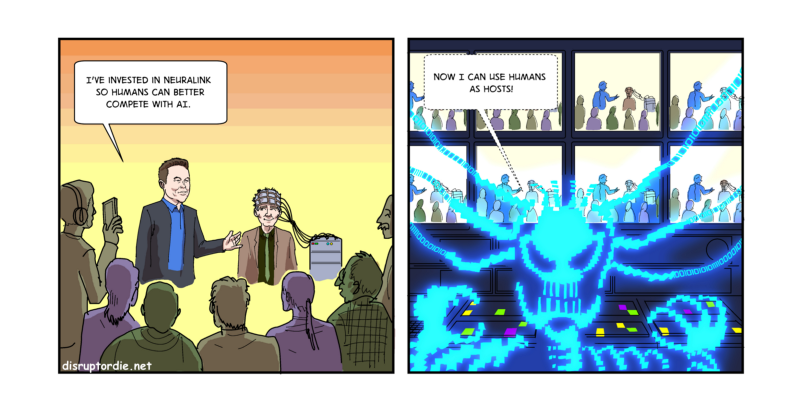
Today, one of the few barriers that Super AI (not the narrow, prescriptively trained machine learning and deep learning variants) would face is the physical gap. This gap still requires humans in order for data centers to function, and humans must tend to physical breakages in the long supply chain required to maintain core utilities, such as electricity.
But Neuralink might enable AI to hop that barrier.
How about Musk’s ambitious plan B for planet earth — colonizing Mars? The computational requirements for such an endeavor are immense. Couldn’t AI hitchhike on computer systems on the way to the lonely red planet?
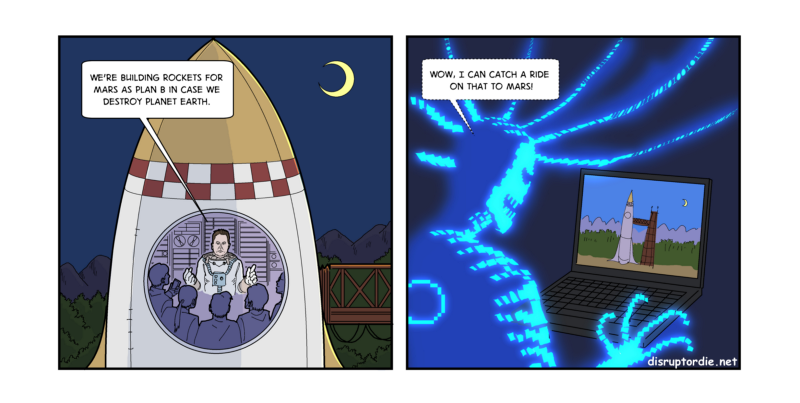
Then there’s his crusade for global warming. Electric vehicles and solar panels will surely reduce global emissions by a significant volume. But Musk has already implemented autonomous driving — AI software to control his cars that can be easily updated with a new software release across the Internet.
In the Stephen King movie Trucks, released in 1997, homicidal trucks come to life and begin killing off the cast of characters. Couldn’t AI, having watched the movie on Netflix, be inspired to use autonomous vehicles as the vehicle for humankind’s extinction?
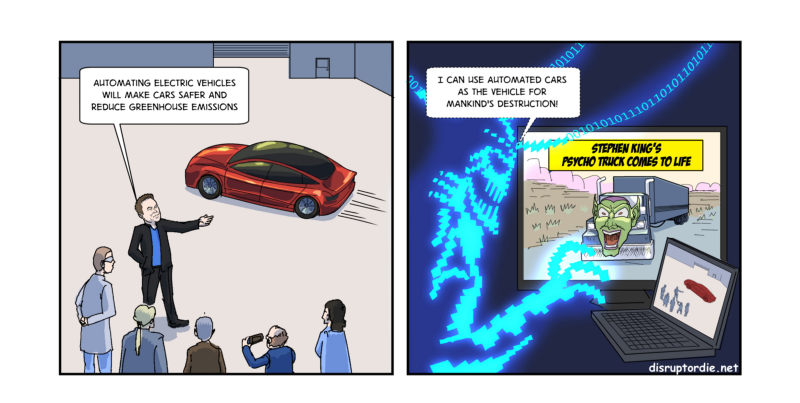
And let’s not get started with what AI might do with giant boring machines from the Boring Company that can quickly tunnel beneath the world’s most populated cities.
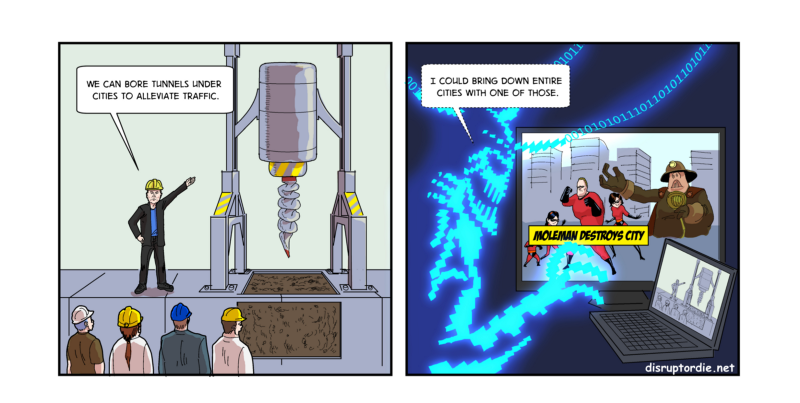
Hollywood depictions of the future are naturally dire. Will The Terminator’s Skynet orchestrate global nuclear warfare and send robots out to exterminate humankind?
We don’t know when Super AI will emerge, and if its nature will be binary — good or evil. We don’t know if it will be singular, or if convergent evolution will deliver us multiple Super AIs to contend with.
We do know that if and when AI does emerge, it will certainly be smarter than Elon Musk (or any of us, for that matter). How might AI use the fascinating and radical world of Elon Musk’s inventions then?
Before Elon Musk convinces the compliant world to regulate AI, perhaps he should consider the potential unintended consequences of his inventions and think more about regulating himself.
After all, the fate of humankind may be in his hands.
Thanks for reading! If you enjoyed this article, please hold down the clap button below ? to help others find it. The longer you hold it, the more claps you give!
About Me
I’ve spent two decades decoding innovation, collecting the hidden frameworks that drive many of the most successful entrepreneurs in technology today. I’ve personally implemented these frameworks, inventing software products at Delphix and Avamar that have driven more than $4 billion in sales. Disrupt or Die is my first book.
Parts of this article are excerpted from Disrupt or Die.